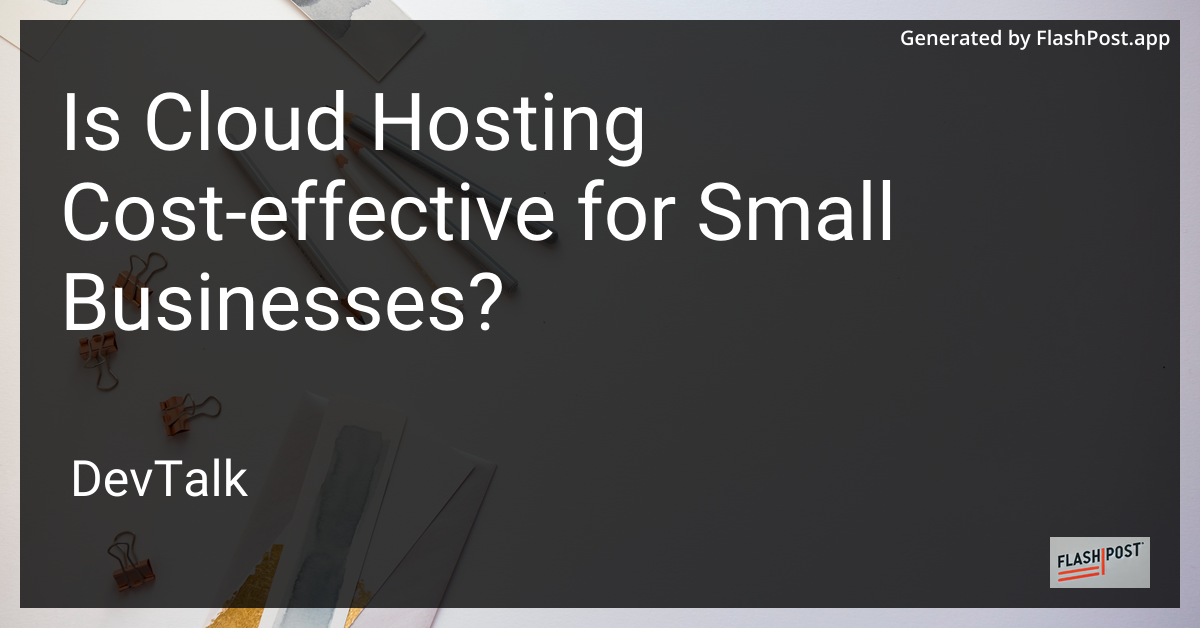Is Cloud Hosting Cost-effective for Small Businesses?
 # Is Cloud Hosting Cost-Effective for Small Businesses?
# Is Cloud Hosting Cost-Effective for Small Businesses?
In the ever-evolving digital landscape, small businesses face numerous challenges, particularly in terms of cost management and technological infrastructure.
One central question that small business owners often grapple with is whether cloud hosting is a cost-effective solution. Let's explore the benefits and considerations that can help determine if cloud hosting is the right financial choice for small businesses.
Understanding Cloud Hosting
Before delving into its cost-effectiveness, it’s important to understand what cloud hosting entails. Cloud hosting uses virtual servers to host websites, leveraging the resources from a network of connected physical and virtual servers. Unlike traditional hosting, where websites rely on a single server, cloud hosting distributes data across multiple servers, promoting flexibility and reliability.
Cost-Effectiveness of Cloud Hosting
1. Scalability and Flexibility
One of the primary advantages of cloud hosting is its scalability. Small businesses often experience fluctuations in website traffic, and cloud hosting provides the flexibility to scale resources up or down based on demand. This ensures that businesses only pay for what they use, preventing unnecessary expenditure on underutilized resources.
2. Reduced Hardware Costs
With cloud hosting, small businesses do not need to invest in costly hardware or worry about maintenance, upgrades, or space management. The cloud hosting provider handles hardware needs and maintenance, allowing businesses to allocate funds more efficiently.
3. Subscription-Based Model
Cloud hosting operates on a subscription basis, offering various pricing plans that cater to different business needs. This model allows small businesses to predict costs more accurately and avoid large, upfront investments associated with traditional hosting.
4. Enhanced Performance and Reliability
Cloud hosting boasts greater uptime and reliability due to its distributed nature. In the event of server failure, other servers can take over, minimizing downtime. This reliability ensures that businesses can maintain their online presence, preventing potential revenue loss during outages.
Considerations for Small Businesses
While cloud hosting offers several financial advantages, small business owners should also consider the following:
1. Provider Selection
Choosing the right cloud hosting provider is crucial. Providers vary in terms of pricing, performance, and support. It is essential to select a reputable provider that aligns with your business needs.
- For those interested in hosting TYPO3, platforms such as DigitalOcean Hosting and Liquid Web Hosting are excellent options.
2. Security Concerns
Data security is a top priority for any business. Ensure that the cloud hosting provider offers robust security measures, including encryption, firewalls, and data backups, to protect sensitive information.
3. Technical Expertise
Migrating to cloud hosting requires a certain level of technical expertise. Small businesses may need to invest in training or hire skilled professionals to manage the transition and maintenance of their cloud environment.
Conclusion
Cloud hosting can be a highly cost-effective solution for small businesses, offering scalability, reduced hardware costs, and improved reliability. However, careful consideration of provider options, security features, and technical resources is essential to ensure a successful transition. By weighing these factors, small businesses can make an informed decision on whether cloud hosting aligns with their financial and operational goals.
For those looking into specific hosting solutions, such as CakePHP, examining the best web hosting for CakePHP options can further refine the decision-making process. Ultimately, the choice of cloud hosting can empower small businesses to optimize their online operations while effectively managing costs.